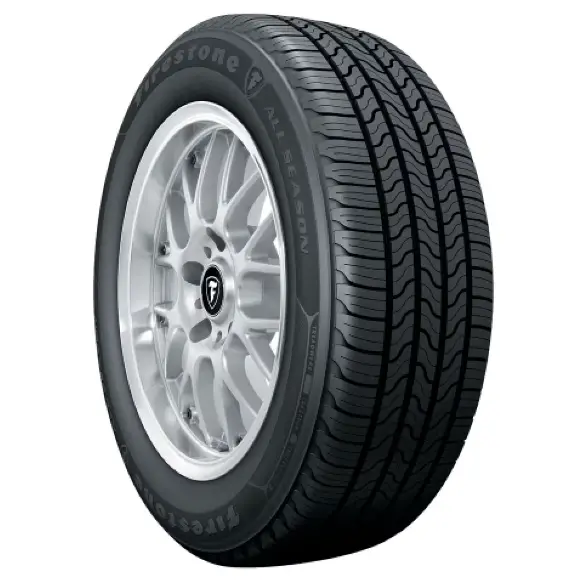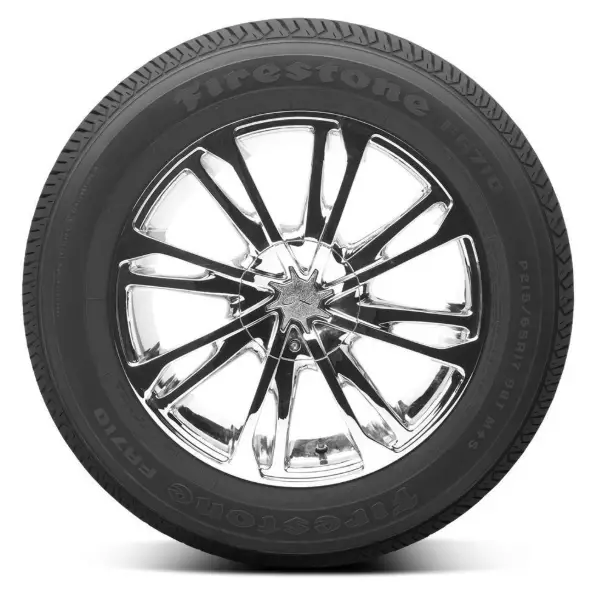Firestone all-season tires are a good choice for drivers seeking reliable performance in various weather conditions. They offer a solid balance of comfort, durability, and affordability, making them suitable for everyday driving.
Firestone all-season tires are designed to provide a versatile solution for drivers who need reliable performance across a range of weather conditions. Whether it’s dry, wet, or lightly snowy roads, these tires promise year-round durability and comfort. However, with so many tire brands out there, you may wonder if Firestone is the best option for your needs. Are their all-season tires truly good?
In this article, we will answer that question by examining the various aspects of Firestone all-season tires, including their construction, performance, and user experiences. By the end of this guide, you will have all the information you need to decide if Firestone all-season tires are the right fit for your vehicle.

Contents
What Are Firestone All-Season Tires?
Firestone all-season tires are designed to offer a balance of performance for most weather conditions throughout the year. They are made to handle dry, wet, and light snowy conditions, making them a popular choice for drivers who live in areas with moderate climate changes. These tires combine the features of both summer and winter tires, so they can provide adequate traction, comfort, and longevity no matter the season.
Firestone offers several models of all-season tires, each designed for different types of vehicles, including sedans, trucks, SUVs, and crossovers. Their all-season tires are engineered to perform well on both city streets and highways while offering improved handling, fuel efficiency, and comfort.
Key Features of Firestone All-Season Tires
Firestone all-season tires are designed to offer versatility and reliable performance in a wide range of conditions. Let’s take a closer look at the features that make them stand out from other all-season tire options.
1. Tread Design
Firestone all-season tires feature an advanced tread design that includes symmetric patterns with deep grooves, sipes, and channels. These features help manage water dispersion, minimize hydroplaning, and provide consistent contact with the road.
The tread design is engineered to maintain traction during wet and dry conditions, ensuring stability and control while driving. The grooves and channels in the tire tread also help to evacuate water from beneath the tire, which reduces the likelihood of slipping in rainy conditions.
2. Performance in Different Weather Conditions
One of the main reasons why Firestone all-season tires are so popular is their ability to perform well in a variety of conditions. Here are how they perform in different types of weather:
Dry Conditions
On dry roads, Firestone all-season tires offer responsive handling, improved braking performance, and stability. The tread pattern provides a large contact patch with the road, resulting in better traction when accelerating or cornering. This makes them suitable for daily driving and long-distance trips on dry, well-maintained roads.
Wet Conditions
When it comes to wet conditions, Firestone all-season tires excel in their ability to channel water away from the tire’s surface. The deep grooves and lateral sipes help to evacuate water from beneath the tire, which increases traction on wet roads. These tires perform well during heavy rain, providing good grip on slippery, wet surfaces. They are designed to minimize the risk of hydroplaning, a common issue that occurs when tires lose contact with the road during wet conditions.
Light Snow
Firestone all-season tires are designed to handle light snow, making them a viable option for drivers who live in regions with mild winters. While they may not perform as well as dedicated winter tires in deep snow or icy conditions, they offer decent traction in light snowfall and slush. The tire’s tread design provides enough biting edges to handle snowy roads, but for areas with harsh winter weather, a set of dedicated snow tires would be more appropriate.
Off-Road Performance
While Firestone all-season tires are not specifically designed for off-road driving, they can handle light off-road conditions such as gravel roads or dirt trails. They offer adequate traction on surfaces like gravel, dirt, or loose sand, making them versatile for outdoor enthusiasts who occasionally venture off the beaten path. However, they are not designed for aggressive off-roading, and off-road tires would be more suitable for such purposes.
3. Ride Comfort and Noise Reduction
Another important feature of Firestone all-season tires is their ability to provide a smooth and comfortable ride. These tires are designed to reduce road noise and vibration, offering a quiet and stable driving experience. Firestone uses advanced technology in the tire’s construction to minimize road chatter and vibrations, which results in improved comfort for both short city drives and long highway trips.
Additionally, Firestone all-season tires help absorb shocks from road imperfections, making the ride smoother and more pleasant for passengers. They are also known for their durability and ability to maintain their performance over time.
Pros and Cons of Firestone All-Season Tires
Like any product, Firestone all-season tires come with their advantages and some potential drawbacks. Let’s explore the key pros and cons to help you decide if they are the right fit for your driving needs.
Pros
Here are some pros of Firestone All-Season Tires –
- Affordability: Firestone all-season tires are often more affordable than premium tire brands, making them an excellent choice for budget-conscious drivers.
- Long Tread Life: These tires are built to last, with some models offering tread life warranties of up to 65,000 miles.
- Comfort: Firestone all-season tires are designed to provide a smooth, quiet ride, with reduced road noise and vibrations.
- Versatility: They perform well in a wide range of driving conditions, including dry, wet, and light snow.
- Durability: Firestone all-season tires are constructed with durable materials that can withstand various road conditions and last for a significant period.
Cons
Here are some cons of Firestone All-Season Tires –
- Snow Performance: While Firestone all-season tires perform well in light snow, they are not ideal for harsh winter conditions. Drivers in areas with heavy snow or ice may need dedicated winter tires for better performance.
- Wet Traction: Although these tires offer good traction in wet conditions, they may not provide the same level of performance as high-end, premium all-season tires.
- Ride Quality: Some drivers report that Firestone all-season tires may feel a bit firmer compared to other all-season options, although this varies depending on the tire model.
Customer Feedback
When it comes to customer feedback, Firestone all-season tires generally receive positive reviews. Many drivers appreciate the balance of affordability and performance that these tires offer. They are praised for their comfort, durability, and ability to handle a variety of driving conditions.
However, some customers note that while these tires perform well in most conditions, they may not offer the same level of traction and performance as more expensive or premium tire brands, especially in severe winter weather.

Firestone All-Season Tires vs. Other All-Season Tires
When compared to other all-season tire brands like Michelin, Goodyear, or Bridgestone, Firestone tires are often considered a more affordable option. However, they do not always offer the same level of performance in extreme conditions. Michelin and Bridgestone, for example, tend to have superior wet traction and winter performance, but Firestone tires are highly regarded for their value and long-lasting durability.
Frequently Asked Questions
Here are some FAQs about Firestone all season tires –
1. How long do Firestone all-season tires last?
Firestone all-season tires typically last between 50,000 to 65,000 miles, depending on driving habits and maintenance.
2. Are Firestone all-season tires good in snow?
They handle light snow reasonably well but are not ideal for severe winter conditions. Dedicated winter tires perform better in snow and ice.
3. Can I use Firestone all-season tires for off-roading?
Firestone all-season tires can handle light off-roading, such as gravel or dirt roads, but are not designed for aggressive off-road driving.
4. How are Firestone all-season tires on wet roads?
These tires offer good traction in wet conditions, with their tread design helping to reduce the risk of hydroplaning.
5. Are Firestone all-season tires affordable?
Yes, Firestone all-season tires are often more affordable than many premium tire brands, providing a good balance of performance and value.
Conclusion
Firestone all-season tires are a solid choice for drivers who need reliable performance across various driving conditions. They offer a good balance of traction, comfort, and durability, making them suitable for daily driving in areas with moderate climates. While they may not perform as well as premium tires in extreme winter conditions, they provide excellent value for money.
Overall, Firestone all-season tires are a great choice for drivers who want reliable, durable tires that perform well year-round at an affordable price.